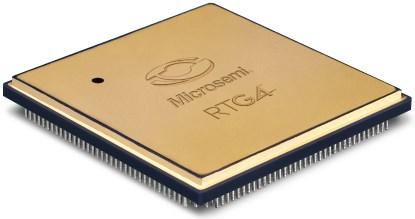Microsemi SoC is well known for its wide range of radiation-tolerant FPGA offerings, which include the following:
- RTSX-SU: High-reliability, rad-tolerant, antifuse-based FPGAs.
- RTAX-S: High-performance, high-density, low-power consumption FPGAs that are specifically designed for space applications.
- RTAX-DSP: Space-flight FPGAs based on the tried-and-trusted RTAX-S family augmented with rad-tolerant multiply-accumulate DSP blocks.
- RT ProASIC3 FPGAs: Flash-based, rad-tolerant FPGAs targeted at low-power apace applications.
- RTG4: High-speed flash-based FPGAs targeted at signal processing applications.
One problem for designers is that these devices are not cheap. I know several folks working on space applications who have told me about the moment of panic that occurs just before they power-up a new prototype board for the first time. It's bad enough to blow up a regular FPGA, but it really makes your eyes water when you smoke a space-rated device.
In order to address this issue and to facilitate lower-cost prototyping and design validation activities, the folks at Microsemi SoC offer "RT-PROTO" versions of their RTSX-SU, RTAX-S, RTAX-DSP, and RT ProASIC3 FPGAs. Now there's a new kid on the block -- the RT-PROTO version of their RTG4 FPGAs.
Launched in 2015, RTG4 FPGAs bring new capabilities to the space market and help solve a variety of challenges common to space applications, including satellite signal processing congestion. In addition to satellite applications, RTG4 FPGAs are ideal for space launch vehicles, planetary orbiters and landers, and deep space probes.
 (Source: Microsemi SoC)
(Source: Microsemi SoC)
RTG4 PROTO FPGAs offer a development and prototyping solution that can be used for development and final timing validation of the flight design. As the RTG4 PROTO devices use the same reprogrammable Flash technology as the flight units, they can be reprogrammed many times without removing them from the development board.
RTG4 PROTO devices use the same silicon and the same packages as RTG4 flight-model FPGAs. They also have the same timing attributes as the RTG4 flight units, including support for the same speed grades as the flight parts.
The RT-PROTO units -- which are presented in non-hermetic ceramic packages -- are electrically tested in a manner to guarantee their performance over the full military temperature range (-55 to 125°C); however, no Mil-Std-883 class B testing is performed and RT-PROTO parts are not subjected to temperature cycling, fine and gross leak testing, X-ray inspection, PIND testing, assembly lot Group B testing, or burn-in.
It goes without saying that RT-PROTO parts are intended for logic functionality and hardware timing verification only. They should not be used for any applications or activities that require the quality of space flight parts, such as qualification of space flight hardware.
Microsemi SoC's RTG4 PROTO FPGAs are available now (click here for more information).
Related posts:
- Programmable ASSP (pASSP) I/F Bridge for Mobile Image Sensors & Displays
- FPGA-Based Real-Time Spectrum Analyzer Sets New Record
- Stratix 10 MX: 1 TBps On-Chip Memory Bandwidth in Single FPGA
- New FPGA/SoC TFT LCD Display Controller IP Core
- Smart FPGA Debugging Tools Reduce Validation Times
- Achronix FPGA-Based Accelerator-6D PCIe Board for Data Center & Network Acceleration
- If You Could Have the Ideal Programmable Logic Device, What Would it Be?
— Max Maxfield, Editor of All Things Fun & Interesting 